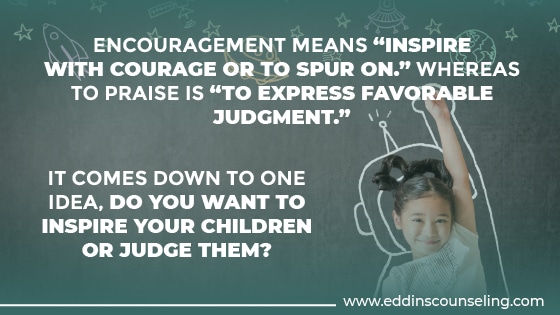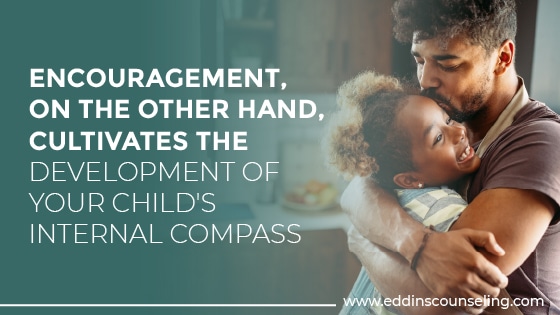August 16, 2021
From Therapist to Parent: How to Build Self-Esteem and Confidence in Kids, Encouragement vs. Praise
Written by Sara Lane
Posted in Parenting & Family and with tags: children, confidence, parenting, self-esteem

Parenting is scary, right?
There is so much depending on you, and we know that now, more than ever, what you say matters. We all just want happy, confident kids that can be decent adults who contribute to society.
That is why it’s essential to learn how to build confidence in kids.
It’s not as easy as it sounds because a lot of people were never taught how to be confident themselves. Our parents had the wrong focus.
Congratulations were based on the task or end product rather than the person or the act behind the result. The A you got was made out to be more important than how you got there.
This article will address all of that and help you make micro-adjustments when parenting that will increase self-esteem and build confidence in your kids.
|
|
Why Your Kids Need to be Confident People
Though it may be on the list of attributes you hope to instill in your kids, self-esteem, and confidence are highly underrated. We want our kids to be intelligent, favored, healthy, successful, etc.
But having a solid sense of self? Almost every aspect of our lives is based on this.
With confidence as a foundation, a child may see an exponential increase in all other possible positive traits. Healthy confidence breeds resiliency, resourcefulness, compassion, self-esteem, and courage.
Whenever you see a self-help book in the store, you can bet the whole text is focused on building your self-esteem and confidence, even if they don’t explicitly say it.
Most adults, regardless of age, will admit that that is a trait they severely lack, and a lot of their relationships or career opportunities have suffered because of it.
They didn’t ask for that raise. In that crucial moment, they didn’t ask for help. When someone took advantage of them, they weren’t able to stand up for themselves.
By using a few smart parenting techniques, you’ll be able to raise confident kids. And with that confidence, they’ll be equipped to handle challenging situations or conflicts and not feel defeated or demoralized when all is said and done.
More often than not, when a person enters a trying situation, and they have little confidence or self-esteem, they leave with even less. They feel reduced, less-than, and incompetent. And no one wants that for their kids.
Encouragement vs. Praise
It wouldn’t be crazy to read those two words and think they mean the same thing, but they are pretty different.
They have adjacent functions and breed very different results. Encouragement means “inspire with courage or to spur on.” Whereas to praise is “to express favorable judgment.”
Take these definitions and apply them to situations with your child. It comes down to one idea, do you want to inspire your children or judge them? Though it may seem like an aggressive concept, that’s what you end up doing.
This is not to say that every time you have ever praised your child for a good drawing or a good job, you make them feel like they are being assessed, but you are inadvertently adding a kind of pressure.
Consider the bigger picture. When the grade your child gets isn’t within the realm of “good,” that only leaves room for it to be “bad.”
As an adult, they will have heard things like “good student,” “good kid,” and “good basketball player” and will be chasing those titles even when it isn’t what they want.
So, here are some things to consider when that test grade comes back.
Is Your Focus on the Doer or the Deed?
Consider these examples of praise (focusing on the doer):
- “You’re such a good boy.” This compliment sets your child up to be a “bad” boy later.
- “You’re such a smart girl.” In this case, your child may feel “dumb” if they don’t perform well academically.
On the other hand, look over these examples of encouragement (focusing on the deed):
- “I appreciate your help in setting the table.” Acknowledge their contributions and support.
- “Thank you for writing those thank you notes — that really helped me!” Highlight the value of their service.
- “I noticed how patient you were with your brother.” Notice their virtue and character.
- Say, “you worked hard getting this room clean,” and recognize the quality of their effort.
These phrases also open room for conversation about those actions and why things like patience, hard work, and helping others are essential.
Is Your Focus on the End Product?
You may praise your child with a focus on the end product, e.g., “Wow, you got an A on your test!” However, if you’re only focused on grades, they are likely to become the most important thing.
A child may struggle in one class, and work hard but still not get an A, which could become a point of stress, discouragement, and anxiety. Eventually, praise may not inspire them to try hard or learn more, regardless of their grade.
Conversely, encouragement flips the primary goal from an end product to their effort, e.g., “Wow, you worked really hard to get an A on this test. Your effort paid off!”
This approach rewards qualities like hard work, perseverance, and a willingness to reaching out for help.
Growth and development are key. Again, who your child is and how they contribute shines brighter than a specific result.
Externally or Internally Motivated?
At first blush, it doesn’t get more favorable than a heartfelt “Good job.” After all, you don’t want to overlook your child’s work. But that’s an example of external judgment.
The external judgment sets your child up to attain goals to please you. In effect, you take away their ability to determine for themselves whether they did well.
When your child reaches their teenage years, this desire for external validation may make them more vulnerable to dangerous peer pressure.
Encouragement, on the other hand, cultivates the development of your child’s internal compass.
Let’s say they made a couple of paintings. Encouraging responses include: “Which painting do you like best?” or “You must feel so proud of your hard work.”
These remarks foster internal reflection and self-appreciation.
Labeling
Telling your child that they are “smart,” “good,” “funny” is a form of praise. But this may lower their expectations of and for themselves.
When we praise specific characteristics, this indicates that the descriptor defines them. For instance, you may be inadvertently telling your intelligent child that they have to look and sound smart and not risk making “stupid” mistakes.”
As a result, they may avoid situations or opportunities that don’t come naturally — believing their qualities are set in stone.
Or worse, that they may not have as much worth or value if people find out they aren’t always the most intelligent person in the room.
You can counter this with fewer labels and encouragement that sounds like this:
- “Your hard work is really paying off.”
- “You seem to really enjoy science.”
- “You are really improving.”
By emphasizing your child’s effort, you inspire your child to feel more empowered and in control of their success. The gift you give them is a lessened fear of failure.
From there, they may be more able to recognize and prioritize perseverance.
|
|
How to Use Praise
Praise for a specific behavior or accomplishment goes a lot farther than for a personality characteristic.
So, when they hand you that amazing report card or their team won the soccer game, focus your attention on the behaviors that got them there.
- “You were so kind to share your toys with your friend. I bet he’ll want to play with you again.”
- “I love the way you drew these flowers; they make me feel happy. And I like the colors you chose.”
- “I appreciate your help setting the table. That really helped me!”
- “That was very creative!”
- “That’s a great observation.”
- “It looks like you put a lot of work into this.”
- “You must feel so proud of your hard work.”
Also, the kids who need encouragement the most get it the least. They get a label and attach their self-worth to it.
When building confidence, that is what we don’t want to happen.
Your Feelings, Your Words
When thinking about the difference between encouragement and praise concerning confidence and self-esteem, look at your own life.
It’s very common for adults today to seek external validation. Social media is an excellent example of this.
You make some great strides at work, and you might be a little offended if your boss came up and said, “You worked really hard on getting this done.”
“Okay, sure, I did, but is it good?”
Usually, encouragement is seen as a kind of diss because they aren’t validating its quality for you. Your boss leaves you to interpret the value, and you are unsure of yourself. Your gut reaction might be to say it’s not good enough.
But think on this for a moment. Isn’t it so much better for your boss to value your opinion of your work? “It’s so creative. You must be so proud. You worked hard on getting this done and I appreciate it.”
They are giving credit to the work you put in and assuming that you know the worth of your work and you wouldn’t waste your time on something you didn’t think was up to par because your worth isn’t mixed in with the value of your work.
That’s what happens when you are confident.
Building Confidence and Self-Esteem, Check Your Expectations and Perspective
Continuing on that line of thought, being mindful of how your expectations play into your parenting is critical, and it may be how you save your child from what ails you. There will be many “should” and “supposed to” moments.
These are valuable perspectives but require moderation and nuance. Too often, “should” and “supposed to” reflect a parent’s unchecked and unrealistic expectations.
Such expectations (the person your child is supposed to be) can never be fully met and can make your kid:
- Fearful
- Confused
- Resentful
To preempt this possibility, take a figurative step back. Tune into your self-talk.
Identify your fears, confusion, and resentment. Identify when and how your issues are being imposed upon your child.
Yes, of course, there are many times when “should” and “supposed to” are valuable guidelines. Stay vigilant to recognize when you need to adopt a more pragmatic and functional perspective on your child’s behavior and choices.
Key Principles For Building Self-Confidence & Self Esteem
You will have to make adjustments to these depending on your kid, but these are tried and true strategies for raising kids who are confident and have high self-esteem.
1. Communicate love and appreciation directly.
If you think, “I don’t have to tell them. They know,” you are wrong.
It doesn’t count if you think it but don’t say it out loud. Tell them that you are glad they are your child. Say the words and mean them.
If you don’t feel it, there is something wrong, and you should find out what’s going on. They will never feel good about themselves if they sense that you are not connected to them.
Look at your child when they are speaking to you, which conveys that they are important and worth listening to.
There are little behaviors you can do consistently to communicate love:
- Use touch with your child when you talk to them.
- Hug them at least every few days.
- Go in and say goodnight before bedtime, which is easy to forget once they become teenagers.
- Look up and smile when they walk into the room.
Every child needs to be the object of a parent’s undivided attention regularly because you are a huge part of their life. They need to know you have their back.
2. Check Your Emotional Responses
Parents must cultivate patience when it comes to enforcing household rules and guidelines. Your kids will complain and whine and test your resolve.
Managing your emotional responses creates consistency. It also serves as an example for your kids to model as they develop their confidence.
When you lose your temper or make a mistake, apologize. Say that you are sorry, be specific about what you are sorry for, and give them a chance to respond.
Also, look for ways to maintain your self-esteem. If you are unhappy, discontent, or disappointed in how your life is turning out, it will be difficult for you to build your children’s self-esteem.
3. Be a Role Model for Assertiveness
Assertiveness is a significant component of confidence, differing from disrespecting boundaries or dominating situations. You can stay true to yourself without imposing yourself on others.
Living this way is a daily reminder to your children that respectful confidence is both possible and preferable. Exploring assertiveness is a big part of self-discovery.
Think about the last time you had to create a boundary with someone. You may have been disappointing them, but when push comes to shove, it’s better than disappointing yourself.
You don’t want your kids to be taken advantage of, but you also don’t want them to disrespect anyone else’s boundaries. If you show that you accept yourself and your actions, you permit them to do the same.
4. Validate, Validate, Validate
When your child feels big emotions, they crave validation.
It may seem well-intentioned to downplay something negative in the name of soothing them, but this is not what they need. It’s not what anyone needs!
When they tell you about something that happened, ask them how they feel about it. Take the time to listen to their answer.
Communicate that you’re doing your best to understand what’s happening, and they are entitled to their emotions. When you know that you have disappointed them, acknowledge it. Ask them how they feel about it.
5. Reinforce Positivity
The equation is fundamental: Encourage positive actions while discouraging negative reactions.
This requires parents to talk with their kids, not at them. Your children will learn a lot from what inspires positive reinforcement from you.
Conversely, your discouragement of negative behaviors can be gentle while making a strong impression.
There is no reason to lose your mind. We promise you won’t feel better, and you won’t stave off more negative behaviors.
6. Learn When to Let Things Play Out Without Your Intervention
Your instinct as a parent may be to protect your children and reduce their discomfort. However, all discoveries require your child to step out of that comfort zone.
This means you must strike a healthy balance between guidance and distance. It’s not fun to watch your kid struggle, but this is precisely how they evolve into confident beings.
They are going to have to handle a lot of situations without you, and you need to let them learn how to navigate life as a whole person, not with their parent partially attached.
7. Spend Quality Time Together
Spend time with them. If you are absent most of the time, they notice, and they probably think it’s because they aren’t important enough.
Spend time alone with them and arrange activities for just the two of you. Ask them what they would like to do.
Ask them to go with you on routine errands just because you want to spend some time with them. Let them be the ones to choose the restaurant, movie, or activity some of the time.
8. Demonstrate Healthy Communication Skills
When you ask a question, encourage them to elaborate. Say, “Tell me more about that,” or ask, “What was that like?” Explain why.
It takes more time, but it conveys that they are important enough to spend the time helping them understand.
When you explain why, you are also saying, “I understand that you need to know why. I am going to help you meet your needs.”
When you ask a question, don’t interrupt when they are answering. When you ask a question, watch your responses.
Take your child and their words seriously. Don’t disagree or criticize their answer. This teaches them that it isn’t safe to be candid and will make them edit what they tell you.
After a disappointment or failure, ask, “What did you learn from the experience?” If they did a good job on something, say so. If they didn’t do such an excellent job on something, point out what they did well.
When you are giving feedback, describe specific behavior. For example, “I like how you asked the question so politely” or “You still need to pick up the towels off the floor.”
But if there is a problem, focus on the issue, not the child. For example, “You didn’t do the last ten problems on this assignment” is more constructive than “You never finish anything.”
Ask what they think. Make sure that your body language matches your words.
If you are out of sync, they will be aware of it. Ultimately, be yourself and tell the truth, but try to be fair about it.
Your child will have to communicate with a lot of different people in all kinds of situations, so don’t set them up for failure now. What you do, they’ll do.
9. Set, Respect & Stick to Boundaries
Say no when you need to say no because kids need to know there are limits and that some things are outside of those limits. There are going to be plenty of things that are completely out of their control.
Saying no and sticking to it shows them that your words have meaning. And in the long run, they’ll learn how to work within and around limitations.
Something that might help is when you say no, explain why, and when you say yes, explain why. But remember, respect is a two-way street.
Make sure to give them a private space where they can express themselves. A poster on the wall can go a long way for a kid.
Also, respect their privacy. They are growing human and need to know that when they have boundaries, that’s okay, too.
10. Be an example to follow.
Kids need models. Ultimately, they learn everything from you. So, take the time to teach them the steps.
Set a positive example with your behavior. It’s unfair to expect that they will know what to do in their daily life if you haven’t shown them how to do it.
You can only expect them to behave with dignity and self-respect if they see you doing it.
Take Action
So, if at this point you recognize that your previous attitude on raising your kids with high self-esteem was misguided, it may feel awkward starting up a different conversation than your child is used to, withholding direct praise.
That being said, start small and focus on progress rather than perfection.
Pause and think for a moment about the behavior you want to pursue, and then find phrases that relate to that behavior.
Make an effort to point out times when your child exhibits that behavior using encouraging words vs. praise. Focus on describing what you see.
You Are Not Alone
It takes confidence to raise confident kids. Yet, circumstances can hamper that mindset and lead to self-doubt. Just as you are there to guide your kids, there are counselors available to you.
Committing to therapy is a proven path for exploring many of the topics discussed above. You can learn more about communication, self-talk, identifying and understanding emotions so that you can interact confidently.
Next Steps
Eddins Counseling Group in Houston, TX, has qualified and experienced family counselors that can provide parental tools and communication support. Call us at 832-559-2622 or book an appointment online.
As you progress, learn, and grow, it also serves to make you better prepared for the daily challenges of parenthood. They may not know it, but your children will greatly benefit from the work you do on yourself.


























